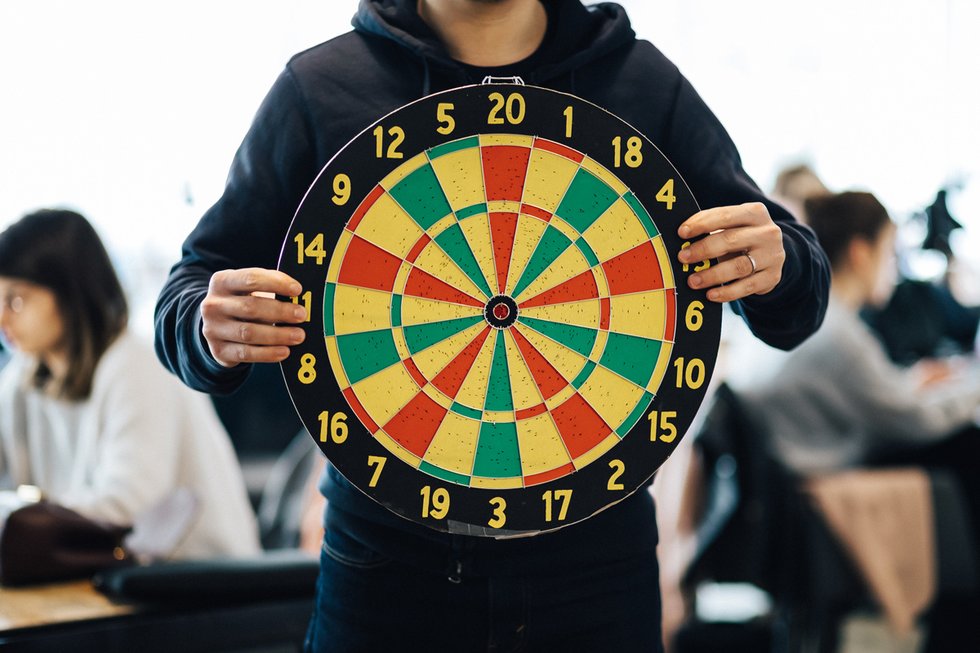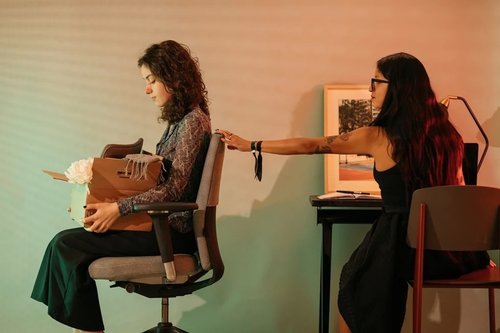Getting cancelled virtually, losing your job in reality
Jan 26, 2021
6 mins


Multilingual journalist
The list of “canceled” celebrities include the likes of novelist JK Rowling, film director Roman Polanski and TV presenter Ellen DeGeneres, but chances are you won’t stop hearing about them or their work anytime soon.
It is a different story for regular people who, after facing intense backlash online, often go on to suffer far more severe consequences. Where did “cancel culture” come from and how does it work? We spoke with researchers about its impact on professional lives as well as with those who have been “canceled”.
It was the month of June and Gillian Philip, a Scottish author, and ghostwriter had just finished writing the seventh installment of Bravelands, a popular children’s series. She was about to start work on the eighth when she found multiple missed calls from her literary agent. The book packaging company she had a contract with, Working Partners, wanted to speak to her.
Philip had a hunch about what was going on. A few days earlier, she had started getting Twitter messages that were “not particularly flattering or pleasant”, which, in a matter of days, turned into a deluge of hate mail. “For about 24 hours, I was just getting this relentless abuse,” she said. The problem was her Twitter account handle. She had updated it some weeks earlier to include the hashtag #IStandWithJKRowling after seeing the bestselling author receive abuse on social media. Rowling had come under fire for her tweets on the transgender community, which have been repeatedly condemned as transphobic by activists and professionals in both the publishing and entertainment industries.
In a phone call, Philip’s literary agent explained that her book packaging company had also been in touch with HarperCollins, the US publisher of the Bravelands books. They were sacking her for associating “the Erin Hunter pen-name with her personal views on Twitter, thus associating them with the whole collective [multiple writers working under the pen-name Erin Hunter].”
“I had a sort of dread in the back of my mind that they were not going to be sympathetic because the publishing industry is notorious at the moment for bowing to Twitter mobs,” said Philip. “And they weren’t—they didn’t even talk to me. They just kind of kicked me out.” In other words, Philip got “canceled.”
What exactly is cancel culture?
“Cancel culture” is a sprawling term. In general, it refers to being called out on social media or offline for racist, sexist, or homophobic behavior and opinions—or any views judged as unprogressive or offensive by a group of users, who believe this person or organization ought to be de-platformed and suffer consequences.
The expression itself, “to cancel someone”, first appeared in the 1991 film New Jack City. The hashtag started to do the rounds on Twitter in 2014 after it was used in an episode of the VH1 reality show Love and Hip-Hop: New York.
Canadian researcher Tina Sikka, a lecturer in media and cultural studies at Newcastle University, believes that the Harvey Weinstein scandal in 2017 and Moira Donegan’s “Shitty Media Men” list was a turning point for cancel culture. “When that was leaked, then it became this issue: are we going to cancel all these men?” she said.
The practice of canceling has become commonplace. Anyone can cancel anyone on social media, and the expression has snowballed to include a range of offenses, many of which are not necessarily “fireable” or even criminals. “We don’t have a mechanism to deal with harms done to people that are not illegal,” said Sikka. “When people don’t have access to forms of redress, then it can express itself through a pile-on—and the internet makes it really easy to do that.”
When an opinion or behavior is considered unacceptable by someone else, canceling is about exerting pressure on an employer via social media to get that person fired. That’s where the cancel part comes in. “Cancel [is] more of a catch-all term to say that these people should have some sort of accountability, should suffer some consequences or should be forced to make amends of some kind,” said Sikka.
Measuring the impact
Cancellations come with varying consequences. JK Rowling has faced intense outrage online over her divisive opinions, yet her books are reportedly still selling fast. Popular food critic and blogger Alison Roman, who made controversial comments about celebrities Chrissy Teigen and Marie Kondo in an interview in May 2020, has also pulled through the incident. Her New York Times food column got suspended and it won’t be returning, but her cookbook, Nothing Fancy, remained high up on Amazon’s bestseller list.
When regular people get canceled, the impact on their professional lives is often devastating. Jonathan Rauch is a senior fellow at The Brookings Institution, a US research group, and author of Kindly Inquisitors: The New Attacks on Free Thought. He thinks that “professional life is the soft underbelly of modern free speech culture”. Rauch is surprised at how common canceling has become.
“There are always lots of people that employers could hire. When confronted with a large number of people demanding the firing or punishing of one of their employees and saying, ‘We’re going to boycott you and your company because you have a racist homophobe or sexist or whatever working for you’, it’s easier for the company to solve the problem by getting rid of the employee,” he said.
One famous case dates back to June 2020. On Twitter, then-unknown young data analyst David Shor tweeted the results of a study conducted by Omar Wasow, an assistant professor at Princeton University. It suggested that violent protests decreased Democratic votes in America in the 1960s. Shor’s tweet coincided with racial protests in the US following the killing of George Floyd, and progressive activists quickly picked up on it, labeling it as “concern trolling”. Shortly after, Shor was fired. Despite widespread criticism over his treatment, his former employer, Civis Analytics, denied that Shor’s tweet had anything to do with his dismissal.
For regular employees, every cancele culture case is a cautionary tale: a warning not to say or do the “wrong” thing because jobs are at stake. The consequences of cancel culture can be far-reaching, Rauch explains, on both mental health and an individual’s professional trajectory. “People frequently lose not just one job, but their entire careers or they have to change careers. They’re deeply scarred by the experience of having people they assumed were friends, colleagues, and supporters, be afraid to be seen with them,” he said. “This is about the hardest thing for a human being: being ostracized by the tribe.”
Philip, a professional author for more than a decade said that her name became “mud in the publishing industry”. She added: “My agent has pretty much told me that I won’t be published by traditional publishers again.”
Since this deeply upsetting experience, Philip has changed her career entirely: she has learned to be a truck driver and has also started a horse-breeding business with a friend. “I’ve had to rethink my entire career because I’m not going to be able to earn a living the way I have until now.”
How to stop ‘calling out’ and start ‘calling in’
The practice of cancel culture has generated pushback over its censorious nature. A group of 150 public figures, including JK Rowling, Noam Chomsky, and Steven Pinker, signed an open letter in which they expressed the “need to preserve the possibility of good-faith disagreement without dire professional consequences”. Rauch, who is among the letter’s signatories, believes there should be countervailing social pressure on employers not to give in to cancellers. “The situation changes if firing [an employee] also brings consequences for the company,” he said.
A “call-in” counter-culture has also emerged, which veteran human rights educator and activist Loretta J Ross has documented. “Call-ins are agreements between people who work together to consciously help each other expand their perspectives,” she wrote in an essay. And it doesn’t matter if it happens in private or on social media: “Its key feature is that it’s done with love.”
To stop call-out culture, André Spicer, a professor of organizational behavior at City, University of London suggests “emphasizing the basis for similarity”. This can help to ignite dialogue when there are radical differences of opinion. “If you have two people fighting about transgender rights, emphasizing what they have in common creates a platform for dialogue to occur around,” he said.
Spicer believes that the most important part of the process is “re-personalization”. This involves creating a dialogue between two people rather than a fight between two memes. “It’s easier to yell and hate a depersonalized characteristic rather than an actual person,” he said. The discussion might not lead to one side changing their mind, but it might help to understand the subtleties involved. “It’s more likely to end up with each person appreciating the views of the other person.”
If a colleague or a working partner says something distasteful on Twitter, a discussion is the only way an apology or making amends can happen. Sikka believes there has to be a mechanism for education, learning, and an apology. “It has to be desired: ‘Yes, I want to be able to repair the damage I’ve done and perhaps move forward.”
Whether it’s information warfare or a necessary path toward progress, cancel culture is influencing how, and if, we voice our opinions. Companies need to get up to speed with canceling, have an internal conversation about their values and workplace culture, and put policies in place to deal with it in a fair and transparent way.
Photo: Welcome to the Jungle
Follow Welcome to the Jungle on Facebook, LinkedIn, and Instagram, and subscribe to our newsletter to get our latest articles every day!

More inspiration: Work trends

Workplace influencers: How employee-generated content is changing the game
Who says becoming an influencer means quitting your day job?
Dec 05, 2024

The rise of homeless workers: A hidden crisis fueled by soaring costs
The rising cost of living is putting individuals on the brink of homelessness, even those with full-time jobs ...
Nov 21, 2024

The emotional toll of quitting in Japan—and the role of professional quitters
In Japan, quitting a job transcends professional boundaries, often becoming a deeply emotional and cultural challenge.
Nov 20, 2024

RTO or risk: Are return-to-office mandates harming company culture?
Flexible work policies have become a core expectation for employees and workers are viewing RTO mandates as restrictive.
Oct 30, 2024

Why are workers quitting after getting promoted?
29% of promoted employees quit within six months of their promotion—but why?
Mar 13, 2024
The newsletter that does the job
Want to keep up with the latest articles? Twice a week you can receive stories, jobs, and tips in your inbox.

Looking for your next job?
Over 200,000 people have found a job with Welcome to the Jungle.
Explore jobs